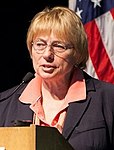| |||||||||||||||||||||
| Registered | 1,058,893[1][2] ( | ||||||||||||||||||||
|---|---|---|---|---|---|---|---|---|---|---|---|---|---|---|---|---|---|---|---|---|---|
| Turnout | 61.24%[3] ( | ||||||||||||||||||||
| |||||||||||||||||||||
Mills: 40–50% 50–60% 60–70% 70–80% 80–90% >90% Moody: 40–50% 50–60% 60–70% 70–80% 80–90% >90% Tie: | |||||||||||||||||||||
| |||||||||||||||||||||
| Elections in Maine |
|---|
 |
The 2018 Maine gubernatorial election took place on November 6, 2018, to elect the governor of Maine. It occurred along with elections for the U.S. Senate, U.S. House, and other state and local elections. Incumbent Republican governor Paul LePage was term-limited and could not seek re-election to a third consecutive term; he later unsuccessfully sought a third term in 2022.[4] This was one of eight Republican-held governorships up for election in a state carried by Hillary Clinton in the 2016 presidential election.
The primaries for this election were the first in Maine to be conducted with ranked choice voting (RCV), as opposed to a simple plurality, after voters passed a citizen referendum approving the change in 2016.[5] An advisory opinion by the Maine Supreme Judicial Court held that RCV would be unconstitutional for general elections for governor and the state legislature. This led state legislators to vote to delay its implementation pending approval of a state constitutional amendment.[6][7] Backers of a "people's veto" turned in enough signatures to suspend this law until a June referendum vote, which restored RCV for future primary and congressional elections.[8]
Governor Paul LePage threatened not to certify the results of the primary elections, saying he would "leave it up to the courts to decide."[9] He also called the use of ranked-choice voting the "most horrific thing in the world."[10] Secretary of State Matthew Dunlap said the results would be binding regardless of whether LePage certified them.[11]
The Republican nominee was businessman and 2010 independent candidate for governor Shawn Moody. The Democratic candidate was Attorney General Janet Mills. State Treasurer Terry Hayes and businessman Alan Caron had qualified for the ballot as independents, though Caron dropped out on October 29 and endorsed Mills. Former state senator and former mayor of Lewiston and Auburn John Jenkins and perennial candidate Kenneth Capron ran write-in campaigns.
Mills defeated Moody and Hayes with a majority to become the first female governor of Maine. This was the first election since 2006 that Maine elected a Democratic governor. Mills was also the first gubernatorial candidate to win at least 50% of the vote since Angus King in 1998, and the first non-incumbent to do so since Kenneth M. Curtis in 1966. Mills also became the first Maine gubernatorial candidate to earn 300,000 votes and received more votes for governor than any other candidate in state history. This also marks the first gubernatorial election since 1982 that a Democrat would win a majority of the popular vote.[12]
- ^ "Statewide Registered and Enrolled Data File (Active Status)" (PDF). Maine Bureau of Corporations, Elections & Commissions. Retrieved December 12, 2023.
- ^ "Statewide Registered and Enrolled Data File (Inactive Status)" (PDF). Maine Bureau of Corporations, Elections & Commissions. Retrieved December 12, 2023.
- ^ "Tabulations for Elections held in 2018". Maine Bureau of Corporations, Elections & Commissions. Retrieved December 12, 2023.
- ^ WMTW (November 9, 2022). "Former Gov. LePage concedes, cites 'grave' concerns over inflation for Maine". www.wabi.tv. Retrieved September 18, 2023.
- ^ "Maine became the first state in the country Tuesday to pass ranked choice voting". Boston Globe. November 10, 2016. Archived from the original on November 16, 2016. Retrieved November 17, 2016.
- ^ "Maine Supreme Judicial Court rules ranked-choice voting unconstitutional". Bangor Daily News. May 23, 2016. Archived from the original on May 23, 2017. Retrieved May 23, 2016.
- ^ TEGNA. "Ranked choice voting delayed until 2021".[permanent dead link]
- ^ "Voters will decide in June whether Maine keeps its ranked-choice voting law". Portland Press Herald. March 5, 2018. Archived from the original on March 16, 2018. Retrieved March 16, 2018.
- ^ Nilsen, Ella. "Maine's governor is threatening not to certify the results of Tuesday's primary". Vox. Archived from the original on June 13, 2018. Retrieved June 13, 2018.
- ^ Levine, Sam. "Maine Gov. Paul LePage 'Probably' Won't Certify Primary Election Results". Huffington Post. Archived from the original on June 13, 2018. Retrieved June 13, 2018.
- ^ "Republican Sanford loses in South Carolina after Trump urges his ouster". CNBC. Archived from the original on July 8, 2018. Retrieved July 8, 2018.
Maine Secretary of State Matt Dunlap said the election results would be binding anyway, the Portland Press Herald said.
- ^ "1982 Gubernatorial General Election Results - Maine". Retrieved April 4, 2023.






